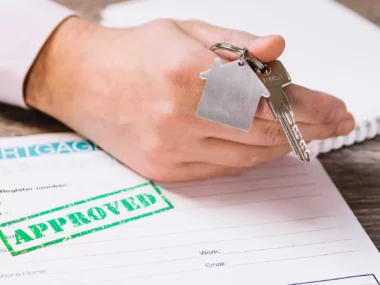Table of Contents
Now that you’ve decided to purchase a home, the next step is to figure out how you are going to pay for it.
Acquiring a home is not a cheap project so you probably don’t have the entire payment just sitting in your bank account. You will therefore need to take a home loan to help with the financing.
There are numerous options when it comes to home financing, which is why home buyers must have a good grasp of how these loans work and which one is best for them.
In this guide, we’ll be taking a thorough look at FHA and Conventional loans to help you see how to choose right.
This article will give you a breakdown of what both loans are, their eligibility requirements, their differences, their upsides and downsides, and so on.
FHA and Conventional Loan: What is an FHA loan?
A Federal Housing Administration (FHA) loan is a government-backed loan issued by private home loan lenders. It is usually a great option for homebuyers who can’t qualify for a conventional loan, either due to poor credit scores or lack of enough money to settle the down payment.
Since these loans are backed by the FHA, a division of the U.S. Department of Housing and Urban Development, lenders are usually more open to lending to risky homebuyers. Although the FHA backs these loans, they don’t issue them, meaning you would have to work with an FHA-approved lender to qualify for a home loan.
An FHA loan can only be used to purchase a primary residence, meaning no lender will grant you a loan to buy an investment property or a second home. They can come with either a fixed or adjustable interest rate and a loan term of 15 or 30 years. You are however required to pay mortgage insurance premiums (MIP) irrespective of how much you drop as your payment amount.
FHA Loan Eligibility Requirements
To get an FHA loan, below are some of the eligibility requirements you have to meet:
- A minimum of 500 as your credit score.
- A 10% down payment if your credit score is between 500 and 579.
- A 3.5% down payment if you have a credit score that is 580 or higher.
- A Debt-to-income ratio that is 50% or less.
- The property that you wish to purchase must be intended as your main residence.
What is a Conventional loan?
This is a private home loan that is not backed by the government, which is why lenders have stricter eligibility requirements compared to FHA loans. Conventional loans are less expensive than FHA loans but you need to have a good credit score and sufficient down payment to get them. They are highly recommended if you have a good financial standing. Conventional loans are usually issued by private lenders such as banks, credit unions, and savings and loan associations.
Some lenders would grant you a conventional home loan and only request a 10% down payment. However, paying up to 20% can fetch you low-interest rates and favorable loan terms. Also, if you drop less than 20% as your down payment, you might have to pay private mortgage insurance (PMI).
There are two types of conventional home loans, namely – conforming and non-conforming loans.
Conforming loans: These are conventional loans that abide by certain rules set by the federal government and by the government-sponsored enterprises known as Fannie Mae and Freddie Mac. They often have limits.
Non-conforming loans: These are home loans that don’t abide by Fannie Mae and Freddie Mac’s rules.
Conventional Loan Eligibility Requirements
Below are a few of the eligibility requirements for conventional loans:
- A credit score of at least 620, if you want to stand a chance of getting the loan.
- A DTI ratio of less than 36%.
- Proof of your ability to make a down payment in a timely manner.
Differences between FHA loan and a conventional loan
There are numerous differences between an FHA loan and a Conventional loan, especially in terms of their eligibility requirements. Below are some of these differences:
Credit score requirements
1. FHA loan – If you have a credit score of at least 580, you should be able to get an FHA loan. Any score lower than this will prevent you from getting a loan from some lenders, and the ones who agree to lend to you will ask for a bigger down payment.
If you have a credit score of 580 and above, you will only need to pay a 3.5% down payment. On the other hand, if your score is between 500 and 579, you will need to come up with a 10% down payment.
2. Conventional loan – To get a conventional loan, most lenders will require a credit score of at least 620. However, a credit score of 740 and above will fetch you more favorable loan terms such as a lower down payment and a lower interest rate.
Down Payment Requirements
1. FHA loan – If you have a credit score of 580 or higher, you will only need a 3.5% down payment. However, if you have a lower credit score, you will need to pay up to 10%.
2. Conventional loan – A good credit score can fetch you a loan that accepts a 3% down payment, and some lenders might even accept 1% down. A poor credit score, on the other hand, will require you to make an additional payment for private mortgage insurance (PMI).
Debt-To-Income Ratio (DTI)
Your DTI is all the monthly payments you make in service of debts, divided by your gross monthly income. It is one of the ways that lenders use to determine your ability to manage the monthly payments to repay the loan.
1. FHA loan – To get an FHA loan, your DTI is expected to be 43% but you may qualify with a 50% ratio or higher if have an excellent credit score. You are also expected to show proof of a stable income before you can qualify. If your DTI is too high, you can always use an income of a non-occupant co-borrower to boost your income and reduce your DTI.
2. Conventional loan: Conventional loans prefer that you have a DTI of 43% or less if you have a good chance of getting a loan. However, some lenders accept DTI ratios up to 50%
Mortgage Insurance
1. The essence of mortgage insurance is to protect lenders against losses if for some reason you fail to repay the loan.
FHA loan – Because FHA lenders assume more risk granting loans to borrowers with poor credit scores, their mortgage insurance is usually higher compared to a conventional loan. You are required to pay FHA mortgage insurance regardless of how much you’ve paid as your down payment. You’ll have to pay an upfront mortgage insurance premium (UFMIP) which is 1.75% of the loan amount, and an annual mortgage insurance premium (MIP) which is between 0.15% and 0.75% of the loan amount. The MIP is usually divided by 12 and added to your monthly payment.
Conventional loan – You are required to pay private mortgage insurance (PMI) on a conventional home loan if your down payment is below 20%. Annual PMI premiums often cost between 0.15% and 1.95% of the loan amount. Unlike FHA loans, your credit score, along with the amount paid as your down payment, will determine how much your PMI will be.
Loan limits
Both FHA and Conventional loans have limits, and the limits are set by the county where the property is located.
1. FHA loan – FHA mortgage limits are usually lower compared to conventional loans. The limit differs based on the location of the property you’re purchasing. The limits for FHA loans for 2023 is set at $472,030 for a single-family home in low-cost areas, but can be up to $1,089,300 in high-cost areas.
2. Conventional loan – Conventional loans abide by the loan limit set by the Federal Housing Finance Agency. The limit for 2023 ranges from $726,200 for a a single-family home in low-cost areas to $1,089,300 in high-cost areas.
Property Type and Standard
1. FHA loan – To get an FHA loan, you must intend to live in the home that you want to use the loan to purchase, i.e. it has to be your main residence. Also, FHA appraisers will assess the house to determine if it meets FHA Minimum Property Standards.
2. Conventional loan – Unlike FHA loans, you can use a conventional loan to purchase a second home or an investment property, i.e. you are not mandated to use the loan to buy a house that must be your main residence. Here, the Home Valuation Code of Conduct regulates the standards, protecting appraisers from realtor and lender influence.
Upsides and Downsides of FHA loans
Below are some of the upsides and downsides of an FHA loan:
Upsides
1. The required down payment is as low as 3.5%.
2. A poor credit score doesn’t prevent you from getting an FHA loan.
3. The loans are backed by the federal government.
4. It is easier to qualify for an FHA loan.
5. It is lenient with previous bankruptcies.
6. You are allowed to use a non-occupant co-borrower to improve your chances of eligibility.
7. They come with less restrictive DTI requirements.
8. It offers a special 203(k) program for home repairs.
Downsides
1. The down payment might be a bit high in some cases.
2. You’ll be required to pay FHA mortgage insurance premiums.
3. It can prove to be more costly for financially stable homebuyers.
4. You can’t use it to buy a second home.
5. You can’t use a non-occupant co-borrower to qualify unless they are a relative.
Upsides and Downsides of Conventional Loans
Below are some of the upsides and downsides of a Conventional loan:
Upsides
1. You are not mandated to live in the home you bought.
2. The down payment is usually low.
3. Conventional loans can be used to buy a second home.
4. If you need to, you can cancel your PMI.
5. These loans can be less expensive for financially stable homebuyers.
6. You can use a non-occupant co-borrower to qualify.
7. The interest rates charged on them are stable.
Downsides
1. Conventional loans often require a high credit score.
2. The interest rates may be high.
3. It is a bit hard to qualify for them.
4. There is need to pay PMI if your down payment is below 20%.
When is an FHA loan the right option for you?
An FHA loan is the right option for you if you:
1. Can’t qualify for a conventional loan.
2. Wish to purchase a primary residence.
3. Have a poor credit score.
4. Have too much earnings for conventional 3% down payment loans.
5. Need to qualify using the income of a non-occupant co-borrower.
When is a Conventional loan the right option for you?
A conventional loan is the right option for you if you:
1. Need more funds than an FHA loan can lend you.
2. Need to purchase a second home or investment property.
3. Have a steady income source and can qualify on your own.
4. Have a good credit score.
Which is better: FHA loan or Conventional loan?
Deciding on which is better between the two options require a thorough understanding of how each one of them works, their upsides and downsides, and which one you qualify for. Therefore, one can’t generally choose which one is better between these two options.
To Sum Up:
Both FHA and Conventional loans have their individual benefits that make each of them unique and a perfect option depending on what your financial needs are.
FHA loans make it possible for homebuyers with poor credit score and insufficient down payment to get a home loan from lenders who wouldn’t normally lend to them.
Conventional loans cost less than FHA loans but require a good credit score and enough money for a down payment.
We’ve taken ample time to discuss each of them so you will be intimately familiar with both FHA and Conventional Loan and How to Choose Right.






